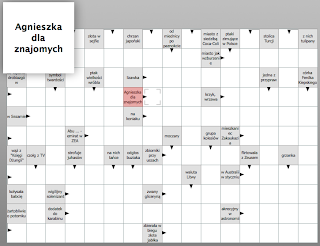The crossword was invented nearly exactly 100 years ago — yes, 2103 is its centenary! We all know that in that time it's spread throughout all English-speaking countries.
But what about other countries? The answer is a resounding yes!
In almost every country that I researched, they have crosswords. The forms are often a bit different from what we're used to — the grids are often non-symmetrical, 2-letter words are allowed, accented characters are often ignored, and sometimes the clues are written into the black squares.
Here are some links to crossword sites from other countries, for your enjoyment.
Afrikaans blokkieraaisel
 |
| Part of a Chinese crossword |
Chinese 填字游戏
Danish kryds og tværs
Dutch kruiswoordraadsel
 |
| Finnish crosswords often include picture clues |
Finnish Sanaristikko
 |
| French grids use a different numbering system |
French mots croises
 |
| A German crossword |
Greek σταυρόλεξο
Hebrew תשבץ
Indonesian teka-teki silang
Italian cruciverba
Japanese クロスワード パズル
Korean 크로스 워드 퍼즐
Polish Krzyżówka
Romanian cuvinte încrucişate
Russian кроссворд
Swedish Korsord and even more Swedish korsord!
Spanish crucigramas
Turkish Kare Bulmaca
As for cryptic crosswords, as far as I can tell, they are very much a British English phenomenon. I think that some countries may have puns or plays on words in some clues, but I don't think there is anything that really approaches the full complexity of a cryptic.
Indonesian teka-teki silang
 |
| This particular Italian crossword, by Antonio Minicelli, uses rectangles rather than squares |
Japanese クロスワード パズル
 |
| A bit of a Korean crossword |
Korean 크로스 워드 퍼즐
 |
| A Polish crossword |
 |
| The Russian grids seem to be the only non-English ones that are symmetrical |
 |
| Part of a Swedish crossword |
Spanish crucigramas
Turkish Kare Bulmaca
As for cryptic crosswords, as far as I can tell, they are very much a British English phenomenon. I think that some countries may have puns or plays on words in some clues, but I don't think there is anything that really approaches the full complexity of a cryptic.

Italian crosswords don't use rectangles rather than squares: the crossword you took from my website is particular, because it is syllabic.
ReplyDeleteAntonio Minicelli
Ah, thank you for the clarification Antonio! I'll fix up the text accordingly :)
Delete